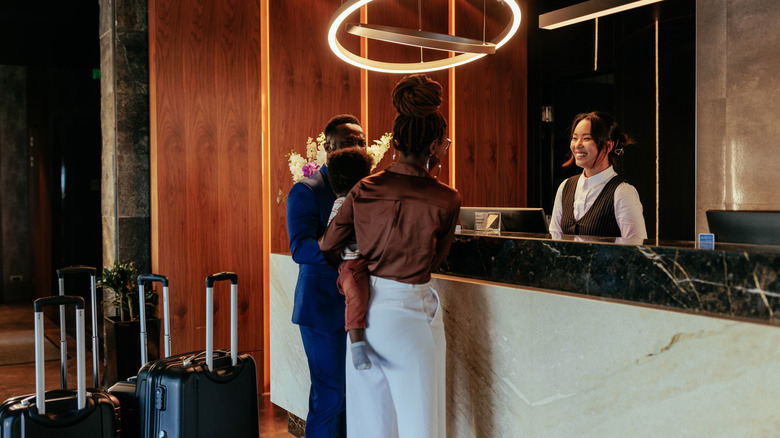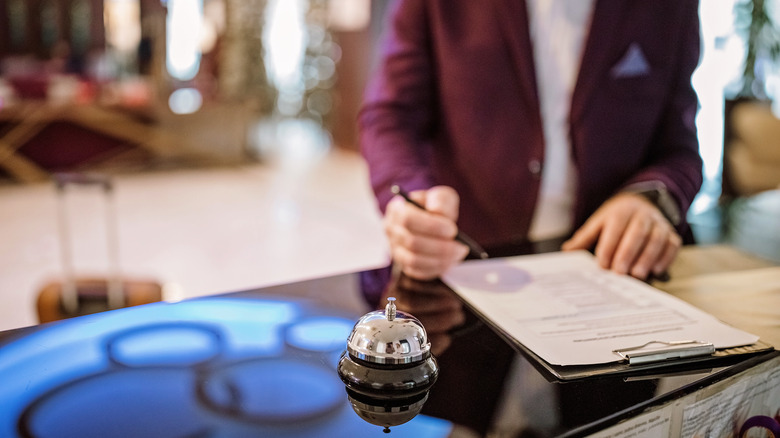Even Frequent Travelers Tend To Make This Pricey Hotel Mistake
Leaving your key in your room and heading out is tempting (and usually no big deal), but before you sashay away from your hotel, make sure the property is okay with a silent exit. Not checking out of a hotel can have pricey consequences. Between ever-increasing room rates, resort fees, and destination taxes, a hotel stay can be a costly proposition on its own. To avoid running up any extra charges, you should always err on the side of caution and swing by the front desk when checking out of your hotel.
There is lots to love about a hotel stay, like luxurious pools and even under-the-radar hotel freebies, but leaving is generally not one. You may be in a rush to get to the airport, trying to organize yourself for the next leg of your journey, all while double-checking you haven't left your charger under the bed or favorite earring beside the sink. Waiting at reception to hand in your key card can feel like a major waste of time, but you can opt for mobile check-out via your phone, the hotel app, or through the in-room information system at many hotels. Just don't walk away before you have checked your bill and made sure everything is in order.
The costs of not checking out of a hotel
Leaving without notifying the front desk is generally fine, which makes it a surprising realization to learn that on some occasions it can be a costly mistake. Incorrect room charges happen. You could have inadvertently set off the sensors in the minibar, another guest or a staff member may have keyed in the wrong room number for a restaurant charge, or your kid may have accidentally ordered pay-per-view but didn't watch the movie. By reviewing your folio before you check out, you can easily catch and deal with these charges on the spot.
Sometimes, you can arrange a late check-out in advance, but the hotel might charge for this convenience. For example, the TWA Hotel at the JFK airport in New York charges up to $150 for a late check-out, and the Hyatt Place Boston Seaport also has an escalating hourly fee. If you check out, the hotel will know you've left, eliminating any questions about whether you are on the hook for a late fee.
TikToker @raimeetravel faced a worst-case scenario when staff threatened to call the police after she skipped checking out of her Japanese hotel. The problem resulted from a misunderstanding: the hotel could not charge the credit card on file for the stay without her in-person consent, so when she left without checking out, the bill remained unpaid.
Checking out has more than monetary benefits
No one wants to pay more for a hotel stay than they have to, but money isn't the only reason you should consider checking out at the end of your stay. Confirming your departure helps the business run smoothly. Hotel housekeeping departments have strict timetables to keep, as they need to turn over rooms in the few hours between when guests leave and the next guests arrive, some of whom have early check-ins.
Notifying the hotel of your departure may allow housekeeping to get in to the room early, giving them a few extra minutes of breathing room. Otherwise, they have to wait until check out time when they can get the all-clear to enter and get to work. A small consideration on your part (in addition to not using your "do not disturb sign" during your stay) can make someone's job easier.
Checking out in person also serves as a good touchpoint with staff. If you stay at the property frequently, or if it's a small hotel with employees you have enjoyed interacting with, your check out presents a great opportunity to thank them, tip them, and go over any thoughts you had about your stay or suggestions for next time.


